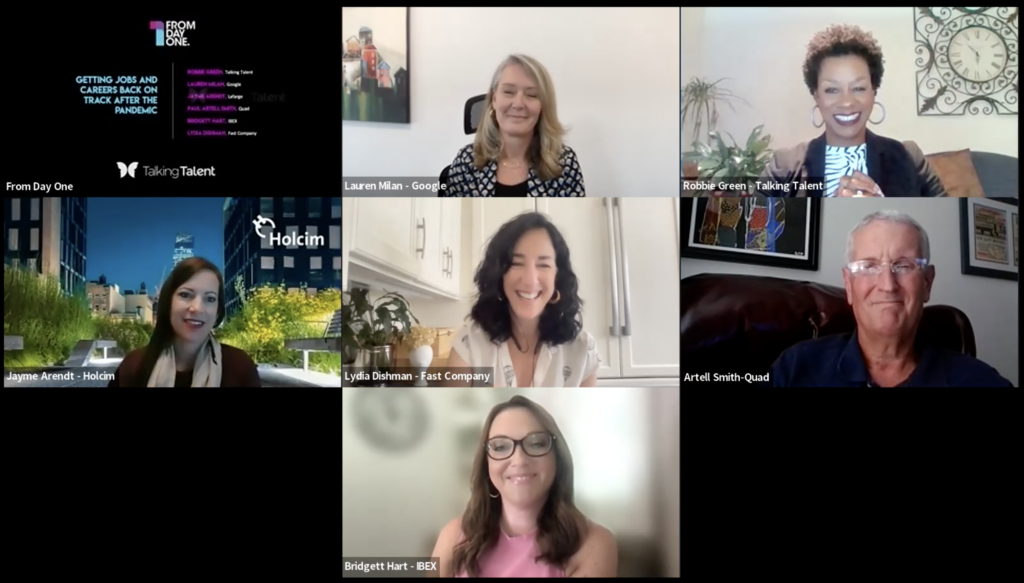Getting Jobs and Careers Back on Track After the Pandemic


Millions of working parents left the workforce during the pandemic, and the vast majority of them were mothers—2.9 million women with children, compared to 500,000 fathers, according to the U.S. Census Bureau and Bureau of Labor Statistics. Many of those parents are expecting to return to work soon, but they have faced continuing struggles with child care and other issues.
In a competitive talent market, employers are offering support in new ways to attract and welcome working parents back into the workplace, specifically to their companies.
To explore what companies can provide working parents in these times, From Day One invited HR and recruitment experts to speak in a webinar titled, “Getting Jobs and Careers Back on Track After the Pandemic,” moderated by Fast Company senior editor Lydia Dishman.
Many of the panelists shared that they had taken breaks from employment themselves. Some of them were working mothers and acknowledged that they had difficulty discussing their needs with their employers.
“I was able to be a working mom that didn’t burden any of my colleagues with my children issues,” said Jayme Arendt, a senior director of HR at Holcim, a global construction-materials company. “And so I think today is an opportunity for us to flip that upside down. Instead of making it something we pride ourselves to get through as warriors, we instead connect and work with each other to say there’s got to be a better way to balance work and life.”
Increasing the visibility of mothers’ needs is vital to changing the culture. Working parents often feel like they’re alone in their struggles. But when they share with others, they find many people are in similar situations, says Robbie Green, head of working parents and caregivers at Talking Talent, an inclusive coaching platform. “As a coach, I always encourage parents to be completely transparent with all of your stakeholders. People are usually willing to help, but they just have to know what you need help with,” Green said.

Increasingly, job hunters seek more flexibility in their next roles, and companies are looking to meet that need. Panelist Artell Smith, a VP of HR and talent at Quad, a printing and marketing company, said that the company’s hiring processes have changed due to its new remote operations. With a much larger talent pool from across the U.S., the company has to be clear about what benefits it’s offering, including flexible shifts and access to daycare.
“It’s the issue of the company now being able to look at an individual and say, ‘Oh, we're going to try to meet your needs,’ as opposed to ‘Here’s the schedule, you have to change your life to meet the schedule,’” said Smith.
Employers also want to make their hiring practices, from the job listing to the interview, more equitable and inclusive to encourage working mothers to apply. To achieve this, Google has changed many of its hiring rubrics, shared Lauren Milan, a leadership recruiter at the company. “We changed from ‘Did you do it?’ to ‘Can you do it?’” Milan said. “And that’s a big philosophy change for us.”
Another struggle parents returning to work face is being behind on the latest education or what a company might expect of them. Future development is also a huge factor in employees’ decisions to stay at work; Culture Amp reported that 59% of people who quit their jobs during the Great Resignation did so due to a lack of developmental opportunities.
“People need to be developed,” said Bridgett Hart, VP of employee experience at Ibex, a customer-experience outsourcing company. “When they come to a role, they need to be developed as they continue in a role, they need to feel that they have a future and a path.”
To accomplish this, Ibex has invested in career coaching, seminars, and workshops, in addition to mentorships for women led by other women in the company. Google offers peer-to-peer mentoring and a support group for mothers across its offices, Milan said. Quad, too, has given employees access to online training modules and courses through eCornell.
Incorporating flexibility, continuing education, and increased benefits isn’t just an HR responsibility, panelists asserted. Companies must rethink their policies and cultures from the top down.
“HR can only be empowered to do what they’re allowed to do. So organizations, companies, CEOs have to say, ‘We want you to strongly encourage that when a new hire comes in, that we support a flexible work schedule,’” said Green.
Some companies might see flexibility as a detriment to productivity, but not offering flexibility can significantly cost their bottom line. In an era when companies are fighting over talent, they must have the resources available to attract the employees they want.
“We were losing some really good talent, because other companies were calling our employees with more flexibility, more options,” Arendt said. “They were doing a better job of listening than we were and so sort of had to really rethink, How do you not lose your good people? Well, you’ve got to talk to them. And you've got to find out what it is that they need.”
Erika Riley is a Maryland-based freelance writer.
The From Day One Newsletter is a monthly roundup of articles, features, and editorials on innovative ways for companies to forge stronger relationships with their employees, customers, and communities.